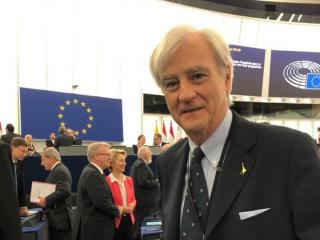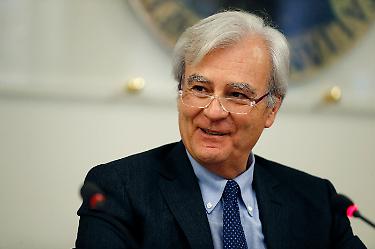Rinaldi: we must keep the unanimity rule in Europe, protect our freedom



Let's face it clearly: why does the commission want to overcome the principle of uninimity? Because it wants to apply policies that are unacceptable for a single, or a few, peoples who are voluntary and imposed from above. Today are the sanctions on Russia, not wanted by Hungary, tomorrow it could be a property tax on Italy to repay the debt or other unacceptable financial measures. This is why unanimity is important and at the center of the discussion. Here is Antonio Maria Rinaldi's speech on this very issue before the AFCO European Parliamentary Commission.
Thanks President!
Colleagues,
I would immediately like to enter into the merits of what could in fact be the most incisive modification of the Treaty: the overcoming of the unanimous vote in favor of the qualified majority vote in the Council, also in terms of foreign policy, common security , budget and taxation . This is not only a worrying idea, since it represents unanimity the only real guarantee left for the defense of national interests in European fora, but is actually also impractical in light of the current regulatory framework.
If the goal is to quickly overcome a mechanism that the supporters of this reform define as an obstacle to the development of a common defense to face the Ukrainian crisis , art. 48 TEU does not offer any process to make it possible in the short term. The ordinary review, in fact, provides for a long and complex process, while the simplified procedure can only involve changes to provisions relating to the Union's internal policies and actions. Furthermore, not even the procedure referred to in paragraph 7 of Article 48 for the passage from a resolution by unanimity to a qualified majority in the Council, following a decision by the European Council, cannot apply to decisions that have military implications or that fall within the defense sector.
Having said that, it is also questionable whether it is really convenient to modify these rules in response to the current crisis, as well as those dedicated to the energy sector enshrined in art. 194 TFEU. Eliminating unanimity , in any sector, would seriously jeopardize the sovereignty of the Member States and the possibility of adequately defending the various national interests as it would easily allow the creation of bloc alliances, that is the constitution of real "trade union pacts " Just to use a classic corporate term, and this certainly does not fall within the spirit of the treaties.
If we want to open a reflection on the opportunity to modify the Treaties, it should rather be a priority to focus on those sectors for which there is an urgent need to rethink the existing regulatory architecture, starting with all the economic governance on which the market is founded. unique.
It is from the Werner report of 1969 – 70 that it is argued that a shared currency must be completed with targeted transfers to individual countries by a federal tax system.
We have experienced first-hand that with the crisis of 2011 and now with the pandemic and the war on our doorstep, two problems arise urgently and very much:
- a) fiscal sustainability of the euro-zone public debt, which with the current rules cannot be resolved with growth alone,
- b) non-core inflation from imported prices that oblige in the current scheme to react with rigid rules as if it were inflation due to pressure on wages, that is, in a pro-cyclical way on employment and investment levels.
We refer, in particular, to the so-called monetary statute present in the TFEU in articles 123, 124 and 125 on the prohibition of monetization , bail-out and fiscal solidarity . The rigidity of the rules outlining economic governance has, in fact, made the euro-zone incapable of facing the crises of recent decades. The Stability Pact has had pernicious pro-cyclical consequences on national economies and on the well-being of citizens and has contributed to the unsustainability of public debts, imposing austerity and stagnation of growth, preventing states from being able to decide their own economic and monetary policies. These rules are currently suspended, but will soon be reapplied, with a very serious impact on the European market and on the national economies themselves.
This is what really matters to the citizens we represent: a policy made up of investments, labor market reforms that are not dictated by the deficit / GDP ratio or by short-sighted obsolete budgetary and conditional constraints, by the rules on State Aid and from an imperfect statute of the ECB , certainly not the modification of the unanimous vote in the Council or other abstruse proposals that would compromise the protection of the interests of the member states and that would allow easy agreements between states to the detriment of others. Therefore, it is on these issues that any review process should focus.
This was the purpose of the Conference on the Future of Europe: to open debate on the real causes of the crises that hit the European Union and to elaborate serious and shared proposals to provide solutions and make the Union sustainable , not to circumvent parliamentary mechanisms and legitimize proposals in the interest of a few and certainly not of European citizens.
Thanks.
WhatsApp Video 2022-05-17 at 19.59.16

Thanks to our Telegram channel you can stay updated on the publication of new articles of Economic Scenarios.
The Rinaldi article: we must keep the unanimity rule in Europe, protect our freedom comes from ScenariEconomici.it .
This is a machine translation of a post published on Scenari Economici at the URL https://scenarieconomici.it/rinaldi-dobbiamo-mantenere-la-regola-dellunanimita-in-europa-tutela-la-nostra-liberta/ on Wed, 18 May 2022 11:00:42 +0000.
